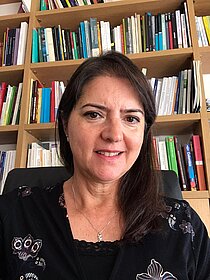Prof. Paula Guimarães

What excites you about adult learning and education?
" I like to learn more about adult learning and education policies, practices and research in order to be more critical in what concerns discourses in adult learning and education policies at the international and national levels, as well as in what happens in different education and learning contexts (formal, non-formal and informal) and to be critically aware and informed about the developments in research, in the different streams that we can find."
Why did you choose to do research in the field of adult learning and education?
"To do research in adult learning and education was part of my first job after finishing my Bachelor's degree. I had then the chance to learn with colleagues how to develop several kinds of research (quantitative and qualitative), by using several data collection techniques. I wrote several research reports and had the chance to present data in workshops, conference, etc. I enjoyed very much this experience and still today, as a lecturer, research is my favourite part of my daily work."
Paula Guimarães is an assistant professor at the Instituto de Educação, Universidade de Lisboa (Portugal) since 2012. She did her PhD on Education Policies, in adult education, and has been studying adult education policies established, implemented and assessed at national and international levels.
Her main interests have been the link that might be established among different levels (mega, macro, meso and micro) of education policy conception and implementation.
CG6: National/regional adult education and lifelong learning policies
Co-Moderator: Prof. Lucas Pacheco Campos
The analysis of national/regional adult education and lifelong learning policies can follow the models proposed by Lima and Guimarães (2011): democratic emancipatory model; modernisation and state control model; and human resources model. This analytical proposal includes several criteria allowing the identification of political orientation and priorities, organisational dimensions and conceptual elements and the interpretation of main subjects underlying adult education policies in recent decades. These models seek to embrace a wide range of adult education policies adopted in different countries and regions, many of these reflecting the impact of the European Union or other international governmental organisations. Built on a continuum, these analytical models are not exclusive but can show hybridisation, as a national or regional policy can present characteristics of different models. Some countries or regions favour policies based on upskilling of the workmanship through learning programmes, its adaptation to the labour market needs and the raise of productivity and economic competitiveness; others are more directed at developing education and training systems, favouring formal education and training, school certification and professional qualification of adults that are part of more formalised and ruled labour markets; others still are oriented towards democratic and emancipatory principles, fostering participation and equality of opportunities within liberal adult education and popular education programmes.
The expected learning outcomes of this comparative group is to gain insights on:
- different as well as similar national/regional adult education and lifelong learning policies in several countries or regions, and
- understanding such similarities and differences according to national/regional historical and contextual aspects.
- CAVACO, C., PAULOS, C., AVES, N., GUIMARÃES, P. & FELICIANO, P. (2022). Insucesso escolar numa perspectiva de género – a perceção dos alunos. Educação e Sociedade, v. 43, e241548 DOI:10.1590/ES.241548
- LIMA, L. C., GUIMARÃES, P. & MIKULEC, B. (2022). The debate on intergovernmental organisations and adult learning and education policies: intersections between the political and scientific fields. International Journal of Lifelong Education. Pre-published. DOI:10.1080/02601370.2022.2110619
- GUIMARÃES, P. & MIKULEC, B. (2021). The paradox of utilitarian recognition of prior learning: the cases of Portugal and Slovenia. European Journal for Research on the Education and Learning of Adults, vol. 12, nº. 1, 109-122. DOI: 10.3384/rela.2000-7426.ojs1479
- MIKULEC, B. & GUIMARÃES, P. (2022). The OECD solutionism and mythologies in adult education policy: skills strategies in Portugal and Slovenia. Studies in Continuing Education. Pre-published. DOI:10.1080/0158037X.2022.2092090)
- MELO, A., LIMA, L.C. & GUIMARÃES, P.(ORGS.) (2021): Actualidade da Educação Permanente. Lisboa: espaço ulmeiro/APCEP.
- EGETENMEYER, R., GUIMARÃES, P. & NÉMETH, B.(EDS.) (2017): Internationalisation in Higher Education. Reflections on the Joint Module “Comparative Studies in Adult Education and Lifelong Learning”. Frankfurt-am-Main: Peter Lang GmbH.
- LIMA, L. & GUIMARÃES, P. (2012): Estrategias Europeas en el Aprendizaje Permanente. Una Introducción Crítica. Xativa (Valência): Ediciones del Crec.
- LIMA, L. & GUIMARÃES, P. (2011): European Strategies in Lifelong Learning: A Critical Introduction. Opladen & Farmington Hills, MI: Barbara Budrich.
- GUIMARAES, P. (2018): Les altres alfabetitzacions. Habitar l’educació d’adults: el treball dels nous educadors d’adults i aprenentatge al llarg de lavida. Quaderns d’Educació Contínua, 39-40, 26-35. DOI: 7103/QEC.40.13262.
- GUIMARÃES, P. & VALDERRAMA-HERNANDEZ, R. (2017): Fostering democratic pedagogy? The participatory budget in Lisbon (Portugal). Social Pedagogy Quarterly, 3(65), 67-83.
- GUIMARÃES, P (2017): The usefulness of adult education: lifelong learning in the European Union and the Portuguese public policy. Andragoška spoznanja/Studies in Adult Education and Learning, 2017, 23(4), 35-50. DOI: dx.doi.org/10.4312/as.23.4.35-50.


